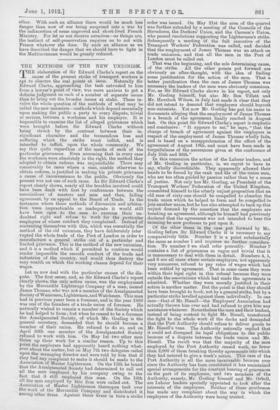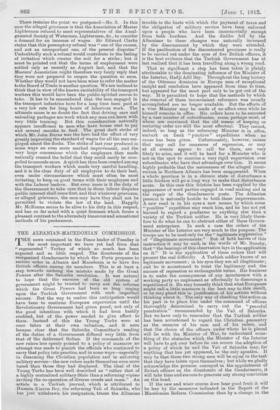THE METHODS OF THE NEW UNIONISM.
THE elaboration of Sir Edward Clarke's report on the cause of the present strike of transport workers is apt to obscure the real points at issue. Naturally Sir Edward Clarke, approaching the task entrusted to him from a lawyer's point of view, was more anxious to get a definite judgment on each of a number of separate issues than to bring out the broader issues at stake. These in- volve the whole question of the methods of what may be called the new unionism—methods which depend essentially upon making the public a party to every dispute, trivial or serious, between a workman and his employer. It is impossible to examine the list of alleged grievances which were brought before Sir Edward Clarke without being struck by the contrast between their in- significant character and the tremendous loss and suffering which the strike must inflict, and is intended to inflict, upon the whole community. We say this quite regardless of the merits of each of the particular grievances. Even assuming that in every case the workmen were absolutely in the right, the method they adopted to obtain redress was unjustifiable. There may conceivably be cases where a man, unable otherwise to obtain redress, is justified in making his private grievance a cause of inconvenience to the public. Obviously the present was not one of such cases. As Sir Edward Clarke's report clearly shows, nearly all the troubles involved could have been dealt with first by conferences between the associations of masters and men and then, failing agreement, by an appeal to the Board of Trade. In the instances where those methods of discussion and arbitra- tion were impracticable or inadequate it would still have been open to the men to exercise their un- doubted right and refuse to work for the particular employers of whose conduct they complained. Instead of contenting themselves with this, which was essentially the method of the old unionism, they have deliberately inter rupted the whole trade of the Port of London in order to manufacture a general strike out of a particular and limited grievance. This is the method of the new unionism, and it is a method which if permitted to continue would render impossible the smooth conduct of the trade and industries of the country, and would thus destroy the very wealth on which the working classes depend for their wages.
Let us now deal with the particular causes of the dis- pute. The first cause, and, as Sir Edward Clarke's report clearly shows, the only active cause, was the employment by the Mercantile Lighterage Company of a man, named James Thomas, who was not a member of the Anialgamated. Society of Watermen, Lightermen, and Watchmen. This man bad in previous years been a foreman, and in the year 1889 was one of the founders of a trade union of foremen. He naturally wished to remain a member of the Society which he had helped to form ; but when he ceased to be a foreman the Amalgamated Society, of which Mr. Gosling is the general . secretary, demanded that he should become a member of their union. He refused to do so, and on April 30th one member of the Amalgamated Society refused to work with him, On May 1st two other men threw up their work for a similar reason. Up to this point the employers had apparently heard nothing what- ever about the matter, but on May 7th two delegates called upon the managing director and were told by him that if they had any complaint to make it should be made to the Association of Master Lightermen. On the 13th he heard that the Amalgamated Society had determined to call out all the men employed by his company owing to the fact that it still employed this man. On the 16th all the men employed by this firm were called out. The Association of Master Lighlermen thereupon took over the work of the Mercantile Company and distributed it among other firms. Against these firms in turn a. strike order was issued. On May 21st the area of the quarrel was further extended by a meeting of the Councils of the Stevedores, the Dockers' Union, and the Carmen's Union, who passed resolutions supporting the Lightermen's strike. Subsequently a meeting of the full executive of the Transport Workers' Federation was called, and decided that the employment of James Thomas was an attack on trade unionism, and that all the men in the Port of London must be called out.
That was the beginning, and the sole determining cause, of the strike. All the other points put forward are obviously an after-thought, with the idea of finding some justification for the action of the men. That a better justification than the case of James Thomas was necessary the leaders of the men were obviously conscious. For, as Sir Edward Clarke shows in his report, not only Mr. Gosling himself, but also Mr. Ben Tillett and Mr. Havelock Wilson, in July last made it clear that they did not intend to demand that employers should boycott non-unionists. Yet now Mr. Gosling has put his name to documents alleging that the employment of James Thomas is a breach of the agreement finally reached in August last. On this point Sir Edward Clarke's report is emphatic and conclusive : " It appears to me," he says, " that the charge of breach of agreement against the employers in respect of the employment of James Thomas wholly fails, and is based on a misapprehension of the effect of the agreement of August 19th, and must have been made in forgetfulness of the assurances given at the conference of July 25th and 26th." In this connexion the action of the Labour leaders, and of Mr. Gosling in particular, is, we regret to have to say, wholly discreditable. They apparently allowed their hands to be forced by the rank and file of the union men, who are too often guided by passion rather than by a sense of justice. Not only has Mr. Gosling, as President of the Transport Workers' Federation of the United Kingdom, committed himself to the utterly unjust proposition that an old man of sixty-one should be compelled to abandon the trade union which he helped to form and be compelled to join another union, but he has also attempted to back up this unjust demand by the assertion that the employers are breaking an agreement, although he himself had previously declared. that the agreement was not intended to bear the meaning he now professes to put upon it.
Of the other items in the case put forward by Mr. Gosling before Sir Edward Clarke it is necessary to say comparatively little. Number 2 is a point substantially the same as number 1 and requires no further considera- tion. To number 3 we shall refer presently. Number 7 contains a list of grievances so vague and trivial that it is unnecessary to deal with them in detail. Numbers 4, 5, and 6 are all cases where certain employers, not apparently very numerous, refused to pay rates of wages which had been settled by agreement. That in some cases they were within their legal right in this refusal because they were outside the associations which had made the agreements is admitted. Whether they were morally justified in their action is another matter. But the point is that they should have been brought to book, not by a general strike, but by a, particular strike levelled against them individually. In one case—that of Mr. Bissell—the Employers' Association had actually thrown him over and had refused to give him any assistance whatever. Nevertheless the men and their leaders, instead of being content to fight Mr. Bissell, transferred the fight to the whole work of the docks and demanded that the Port Authority should refuse to deliver goods to Mr. Bissell's vans, The Authority naturally replied that it could not disregard its legal obligations to the public because of a dispute between the trade union and Mr.
Bissell. The result was that the majority of the men employed by the Port Authority ceased work, no fewer than 2,000 of them breaking thereby agreements into which they had entered to give a week's notice. This case of the Port Authority is all the more inexcusable because ever since the Authority has been constituted it has maintained special arrangements for the constant hearing of grievances on the part of its employees, and two members of the Authority, namely, Mr. Gosling himself and Mr. Orbell, are Labour leaders specially appointed to look after the interests of the employees. Neither of these gentlemen has made any complaint about the way in which the employees of the Authority were being treated. There remains the point we postponed—No. 3. In this case the alleged grievance is that the Association of Master Lightermen refused to meet representatives of the Amal- gamated Society of Watermen, Lightermen, &c., to consider a demand for an increase of wages. Sir Edward Clarke states that this peremptory refusal was " one of the causes, and not an unimportant one, of the present disputes." Undoubtedly such a refusal would contribute to the feeling of irritation which creates the soil for a strike ; but it must be pointed out that the terms of employment were settled only as recently as August last, and that the Masters' Association might therefore very fairly reply that they were not prepared to reopen the question so soon. Whether they would not have been wiser to refer the matter to the Board of Trade is another question. We are inclined to think that in view of the known excitability of the transport workers this would have been the public-spirited course to take. It has to be remembered that the men engaged in the transport industries have for a long time been paid at a very low rate for long hours of laborious work. The ultimate cause is no doubt the fact that driving cars and unloading packages are work which any man can learn with very little training. But this consideration naturally appears insufficient to men who have house rent to pay and several mouths to feed. The great dock strike of which Mr. John Burns was the hero had the effect of very greatly improving the standard of wages for all the men em- ployed about the docks, The strike of last year produced in some ways an even more marked improvement, and the very large concessions which the employers then made naturally created the belief that they could easily be com- pelled to concede more. A spirit has thus been created among the transport workers which needs very careful handling, and it is the clear duty of all employers to do their best, even under circumstances which must often be most irritating, to keep on good terms with their employees and with the Labour leaders. But even more is it the duty of the Government to take care that in these labour disputes public interest shall come first, and that whatever grievance, or alleged grievance, the men may have they shall not be permitted to violate the law of the land. Happily Mr. McKenna seems to be alive to his duty in this respect, and has so far acted with a quiet firmness which forms a pleasant contrast to the alternately timorous and sensational methods of his predecessor.







































 Previous page
Previous page